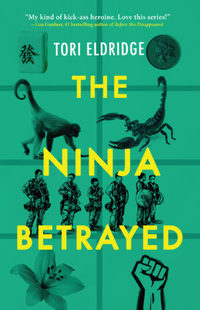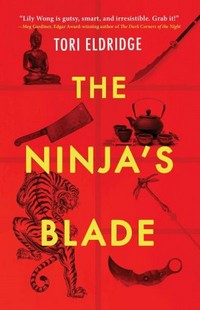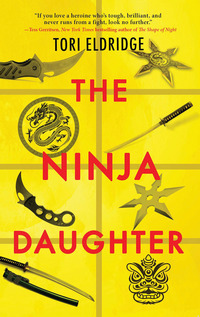 |
The Ninja Betrayedby Tori Eldridge Paperback, 313 pg. Read: October 7, 2021 |

What’s The Ninja Betrayed About?
Hot on the heels of their trip to L.A., Lily’s grandfather summons her mother to Hong Kong for a board meeting where it looks like her mother’s future will be decided (and it doesn’t look like a bright future). Lily comes along with her mother for emotional support and to spend some time with her grandparents. The fact that her love interest, Daniel Kwok, is in the city on business doesn’t hurt either.
As things start to look grim for her mother, Lily’s spider-sense goes off and she starts looking into things. She has to learn a little about international finance and corporate politics (dicey in the first place, but worse when family is added in) in order to make sense of things—and it gets more complicated when someone attacks her when she’s at the home of a family friend.
Lily has to balance her under-the-radar investigation, dating, family obligations, and tourism (and a little extra-curricular fun, see below)—what could go wrong?
Protests and Peril
Pro-democracy protests are common at the time of the visit—and Lily notices how the police are treating the protesters—at times goading them into a riot, or reacting more violently than a situation calls for (or a combination of the two). Her grandparents, and others of similar age/social standing, have a very different take on the protests than those who are closer to Lily’s age.
Because romance and financial intrigue aren’t enough to occupy her mind, Lily gets involved in a little more trouble. Her grandfather’s driver, Mr. Tam strikes up a friendship with Lily—she helps him extract his daughter from a couple of heavy situations related to the protests.
Both Mr. Tam’s relationship with Lily and her escapades near the protests are the most fun part of the novel—they’re the closest this book gets to being an action movie. But it’s more than that—there’s something about these scenes where Lily is more herself, she’s not trying to say and do the right things around her grandfather’s business (or for her mother), she’s not trying to figure out the right things to say and do with Daniel—it’s the closest to her being the L.A. version of Lily—no airs, just trying to keep a young woman out of trouble.
This’ll Even Warm the Cockles of Your Heart
I sank lower and snuggled my face against my mother’s heart, clutching her waist as she rocked me like a child. What childish woes used to bring me to such despair? A broken toy? A stubbed toe? An injured bird? I’d had no idea about the true meaning of pain. Nor had my mother.
“I can’t lose you, Lily.”
“I know, Ma.”
The emotional stresses Lily and her mother are under—from family, her mother’s professional circumstances, and the physical peril that Lily is in and has survived since their arrival in Hong Kong (some of which her mother is aware of for a change) brings them to a breaking point—and brings them closer than we’ve ever seen them. By a long way. Possibly closer than they’ve been since the death of her sister. Knowing her mother, possibly ever.
I’m assuming that once everyone is back in L.A., things will return to how they were before Hong Kong—or at least close to it. But this warming of the relationship (however temporary it may be) was really great to see and adds depth and nuance to both characters. I’ve really been intrigued by the Wong family dynamic throughout this series and this just made the whole thing better.
Whisky Tango Foxtrot?
There was a moment near the end (that’s as specific as I’m going to get) where Eldrige literally caused me to yell, “WHAT?” at the book. I didn’t drop the book, but I may have bobbled it a bit. It was something I absolutely didn’t see coming, yet was completely believable.
And I’ve probably said too much about it. I could easily do at least another two paragraphs, though.
So, what did I think about The Ninja Betrayed?
This was almost a one-sitting read for me, and I was gripped throughout. Due to an appointment, I had to set it aside with only 30 pages left to go, and it took me about eight hours to get back to it—talk about torture.
This is Eldridge’s best so far—in terms of action, suspense, emotional weight, complexity—and sheer entertainment value. Lily’s brain is almost as important as her fighting skills this time—it was almost possible for Lily to save the day without having to exercise any of her martial arts. Almost—fans might want character growth and development, but we want to see Lily do her thing.
There’s a lot of strong character growth and development, some new layers to the relationships in Lily’s life—a worrying development with a character back in L.A.—and a heckuva secret is revealed. There’s almost nothing to complain about here and a lot to relish.
I can’t wait to see what happens next—the last chapter doesn’t really end on a cliff-hanger, but it sure propels the reader toward the opening pages of the next Lily Wong adventure.
Go read this.

This post contains an affiliate link. If you purchase from it, I will get a small commission at no additional cost to you. As always, opinions are my own.
![]()








 Grab a book, any book.
Grab a book, any book.